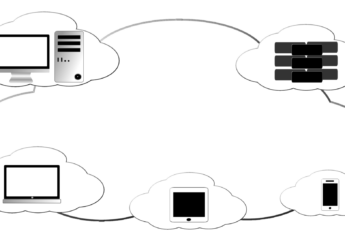Cloud Integration: Simplifying Business Operations
by Barsha Bhattacharya Cloud Computing 16 January 2025

Key Takeaways:
- Cloud integration streamlines processes and enhances productivity.
- Choosing the right tools can significantly cut operational costs.
- Security and data protection are crucial in cloud integration.
Business operations are modernized with the application of cloud integration. The purpose of cloud integration is to unify all services and applications that are cloud-based. This ensures that operations in a business functions smoothly and efficiently.
There are several benefits of cloud integration for businesses namely minimizing downtime and optimizing the processes. Furthermore, it also accelerates the response time of the businesses to the market demands.
Your business will remain responsive and agile if you integrate your business phone systems into cloud solutions. This ensures any further growth of the business thus, cementing their leadership position in the market that is highly competitive.
What is Cloud Integration?
The process of cloud integration connects various systems and applications thus, improving business operations. The operations and functions of the business become more streamlined along with increasing collaboration.
You will experience better decision making with cloud integration in your business. The process of cloud computing will help businesses harness the power of increasing efficiency among operations of the business.
Simultaneously, with technology advancement, cloud integration will update all systems in real-time. Let us learn about how the whole process works.
How Cloud Integration Works?
Why don’t we go through a step by step method which will guide you through the cloud integration process. These steps also include different tools which help integration of all data in the cloud.
The first step is about identification of needs for cloud integration thus, evaluation of the infrastructure and operations of business. This infrastructure helps in determining the data sources, applications and systems of the business.
The key processes that are identified require automation while the data silos might negatively impact the business operations. The next step is choosing the right cloud integration tools such as iPaaS solution, middleware and API management tools.
These tools will ensure the integration goals along with the technological environment of business. You can map the process of how you can move the data between various cloud systems next time. The process will then become automated!
Now you will need to test all systems and accordingly, guarantee that the systems can operate efficiently. Monitoring cloud integration after the solution goes live thus, an efficient process of business operation takes place.
Benefits of Cloud Integration for Businesses
When you combine business phone systems and cloud technology, there are several benefits. You not only get operational efficiency in your business but also an enhanced communication with cloud integration.
Businesses can adjust their capacity along with their features when growing! So how cloud integration helps businesses grow better? The cloud-based phone systems actually help integrate scalability to your business operations.
With the help of cloud integration, remote access is available. Simultaneously, team communication becomes seamless across various locations.
Cloud systems offer cost-effectiveness, advanced features, and enhanced reliability, making them ideal for businesses to stay connected. In this fast-paced digital environment, you must keep your business relevant.
Your business integrates cost-effectiveness, enhanced reliability along with advanced features through Cloud systems. Therefore, through cloud integration, you can keep your business competitive and connected.
Business agility is something that cloud integration brings to a business because it allows business to launch new services and products. Simultaneously, the process also helps business operations to help gain real time understanding of the business progress.
With cloud integration, businesses will experience seamless collaboration especially because teams can easily access data across different applications and share it across it. Furthermore, cloud integration leads to an aggregated form of data processing through the cloud.
Your business will experience better data accessibility as the integrated systems contribute to a unified view of data.
Choosing the Right Cloud Integration Tools
There are many tools for cloud integration available however, you have to be aware and prepared to choose the right one. You have to keep in mind the broader strategic goals along with the technological infrastructure of your business.
Ultimately, using cloud integration is part of the decision-making process. It is inclusive of cost, user-friendliness and compatibility. The needs of businesses and markets are evolving everyday. Therefore, businesses that will use cloud integration must focus on tools.
These tools will help the business along with adaptability features and offer scalability. A business will gain profound insights about operations with the tools provided. These tools will integrate robust analytics capabilities which will result in continuous improvement.
The insights will contribute to enhanced decision-making on your side. Therefore, it is important to choose the right cloud integration tools. Furthermore, cost effectiveness is also an integral part of the cloud integration tools thus, managing business effectively.
The Role of Security in Cloud Integration
Security and data protection remain central to cloud integration strategies. There have been concerns about data breaches especially now that there are several companies who are storing their data in the cloud.
It is necessary for the business to stay compliant to the regulations with the increasing data breaches. With cloud integration, security protocols are also increasing thus, it is important for you to use encryption methods.
This will ensure safeguarding sensitive information and it is imminent to use encryption methods. Your business must have regular security audits along with updates thus, integration tools which will build trust by protecting data with customers along with stakeholders.
With regular cloud providers, you can ensure that the business can effectively engage with the increasing market competition. It is easier to gain business goals with the help of cloud integration as it offers scalable computer instances along with effective networking capabilities.
Wrapping up!
Concluding our take on cloud integration, businesses will launch more services and products effectively. This is only possible when the cloud integration process eliminates the risks of data breach and inconsistency.
Monitoring the cloud performance helps in overall efficiency of the business operations. Additionally, the physical infrastructure for the business seems unnecessary once you start cloud integrating.


































































































